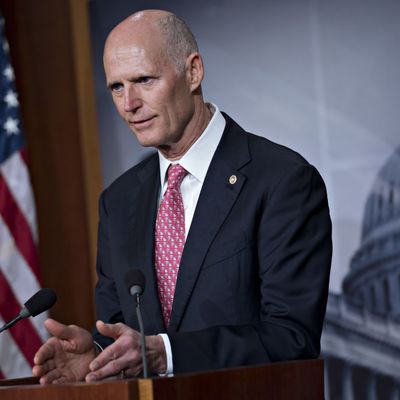
If the Trump administration has a domestic policy doctrine at this point, it could be described as the following practice: the appointment of industry insiders to Cabinet-level positions in order to deregulate or otherwise surgically dismantle the protections of a given department.
In this spirit comes the announcement that Florida Senator Rick Scott intends to deliver on President Trump’s promise that the GOP “will soon be known as the party of health care.” On Thursday, Trump told reporters that Scott, and fellow Republican Senators John Barrasso of Wyoming and Bill Cassidy of Louisiana, will lead the party’s push on health-care reform.
“They are going to come up with something really spectacular,” the president said.
If by spectacular, he means a candidate who was at the helm of a company that pleaded guilty to historic efforts to defraud Medicare, the president has found his man. In the 1990s, Scott was the CEO of Columbia/HCA, a company that, under his direction, owned more than 340 hospitals, 135 surgery centers, and 550 home-health locations by the time Scott resigned in 1997. That year, federal agents announced an investigation into whether or not the company defrauded Medicare and Medicaid on a massive scale. Turns out, they did: According to Politifact’s summary of the settlement Columbia/HCA made with the Justice Department, the company took the following actions while Scott was CEO:
- Columbia billed Medicare, Medicaid, and other federal programs for tests that were not necessary or ordered by physicians;
- The company attached false diagnosis codes to patient records to increase reimbursement to the hospitals;
- The company illegally claimed non-reimbursable marketing and advertising costs as community education;
- Columbia billed the government for home health-care visits for patients who did not qualify to receive them.
As part of the settlement, Columbia/HCA agreed to plead guilty to 14 corporate felonies — charges that involve financial penalties, but no jail time. (Corporations are people, but they cannot be sent to prison.) Over two settlement rounds, Columbia/HCA wound up paying the government $1.7 billion in criminal fines, civil damages, and penalties, in what the Justice Department called “the largest health-care fraud case in U.S. history.”
Naturally, Democrats have attempted to use this information to weigh down Scott’s electoral prospects in a state with one of the highest rates of Medicare beneficiaries as a percentage of the population. But Scott has been able to rise above the fray, in part by the virtue of spending a ridiculous amount of his own money. In 2010, Scott spent $75 million of his own fortune to become the governor of Florida; after vowing he wouldn’t do that again, Scott then spent $12.8 million of his family’s money to propel his 2014 reelection campaign. To make it something of an exorbitant tradition, Scott self-financed his 2018 campaign to the tune of $63.6 million.
In his eight-year career in politics, Scott has wavered in his positions on health care more than the average Republican. Coming into the governor’s mansion, Scott refused to expand Medicaid under the Affordable Care Act. But in 2013, he agreed to accept federal funds for Medicaid expansion and by his second term, Scott reversed his position on the expansion.
Still, as the Orlando Sentinel notes, since November 2018, “Scott has written four op-eds stressing the urgency of repealing Obamacare.” And on a Sunday appearance on Face the Nation, Scott discussed the possibility of the Republican “alternative” to the ACA: Despite having nine years to come up with a viable replacement, the only concrete policy the senator could commit to was that the GOP’s future policy would protect patients with pre-existing conditions. Scott, a lawmaker, also surprised host Margaret Brennan when he told her that he “look[s] forward to seeing what the president’s going to put out.”
According to a report from Axios, noted legal expert Donald Trump is not confident that the lawsuit attempting to strike down the ACA is going to succeed. Rather, the president is concerned that Democrats will hammer him on health-care issues in 2020 — thus the pivot to “the party of health care.” Rather than actually develop an actionable policy portfolio after the Obamacare-repeal failures of 2017, Axios reports that Trump intends to “brand” his party as caring about pre-existing conditions, and that he “plans to repeat this message again and again and again.”
If the motion sounds hollow, at least it’s consistent with his party’s greater efforts on health-care reform. Senate Republicans are reportedly hoping Trump will soon drop the idea, and when Chuck Grassley was asked if the two Senate committees overseeing health care policy intended to draft an ACA replacement proposal, he responded with a firm “no.”






























